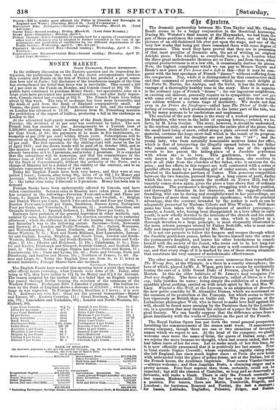Cituirto.
The dramatic partnership between Mr. Tom Tayloniiirl Mr. Charles Reade seems to be a happy conjunction in the theatrical horoscope. During Mr. Webstef s final treason at the Haymarket, we had from the pen of these gentlemen the comedy of Masks and Faces, one of the best pictures of an old-fashioned life ever put upon the stage, and one of the very few works that being put there remained there with some degree of permanence. This week they have proved that they are in possession of that most peculiar of dramatic arts, the art of writing an original Adelphi piece. The Adelphi, as everybody knows, is to London what the three great melodramatic theatres are to Paris; and from these, when original productiveness is at a low ebb, it occasionally derives its pieces. Now, the highest compliment which we can pay to Messrs. Taylor and Reade's new piece of Two -EOM and a Life is this-that it may be com- pared with the best specimen of French " drame " without suffering from the comparison. Nay, while it is distinguished by that constructive skill and that command of powerful situation which create such delight at the Porte St. Martin, the Ambigu, and the Gate, it has the further ad- vantage of a thoroughly healthy tone in the story. Here it is superior to the ordinary type of French " drame " ; for our ingenious neighbours, in exciting our interest, generally require us to sympathize tent soft pen with some evil or at any rate anti-social passion ; and thus their works are seldom without a certain tinge of morbidity. We doubt not that even in La Prare des Naufrage:s-called here The Thirst of Gold-the feeling of revenge, which predominated in the latter part of the tale, was felt by many persons to be unchristian and unpleasant. The nucleus of the new drama is the story of a wicked postmaster and his daughter, who were in the habit of opening letters,-related, we be- lieve, by M. Leon Gozlan. The story, however, it should be understood, is the nucleus only, and no more contains the entire plot of the piece, than the small hard lump of snow, rolled along a plain covered with the same material, contains the huge snow-ball which is the result of its progress. The postmaster and his daughter are put into the "45"; ; and the young ,lady, who from naturally honourable motives bates her office, which is that of interpreting the illegally opened letters to her father who cannot read, abhors it still more when one of the epistles reveals to her parent the hiding-place of a Jacobite gentleman with whom she is in love. This gentleman, whom she has only known in the humble disguise of a fisherman, she resolves to save at all risks from the clutches of her father, who is anxious for the prize ; and her efforts in this respect are well contrasted with a series of parallel efforts made by a foundling girl of ruder nature, who is equally devoted to the handsome partisan of James. This generous competition between the two females, pursued through a long course of peril, during which the hero actually mounts the scaffold on Tower. Hill, but for- tunately comes down again, gives the piece a tone above that of ordinary melodrama. The postmaster's daughter, struggling with a false position, and thoroughly feminine in her character, and the ruggedly-trained foundling, who can be daring and straightforward in her proceedings, are two figures of more than usual dramatic significance, with the practical advantage, that the contrast intended by the author is such as can be adequately preserved by Madame Celeste and Miss Woolgar. Still more pains has been taken with the development of another personage,- namely, a Jesuit, who, having been disappointed in a love affair in early youth, is now wholly devoted to the interests of the church and his order. The sacrifice of an individuality to an idea, which is implied in a thorough devotion to a large principle, Is most eloquently illustrated in the more solemn passages uttered by Father Redelffe, who is most care- fully and impressively personated by Mr. Webster.
It is not our purpose to follow the dangers and escapes through which the Jacobite gentleman passes, before he throws himself into the arms of the postmaster's daughter, and leaves his other benefactress to console herself with the society of the Jesuit, who turns out to be her long-lost father. We would simply state, that the story is well conducted through- out, and that every stage of it is marked by one of those strong situations that constitute the very essence of melodramatic effectiveness.


































 Previous page
Previous page